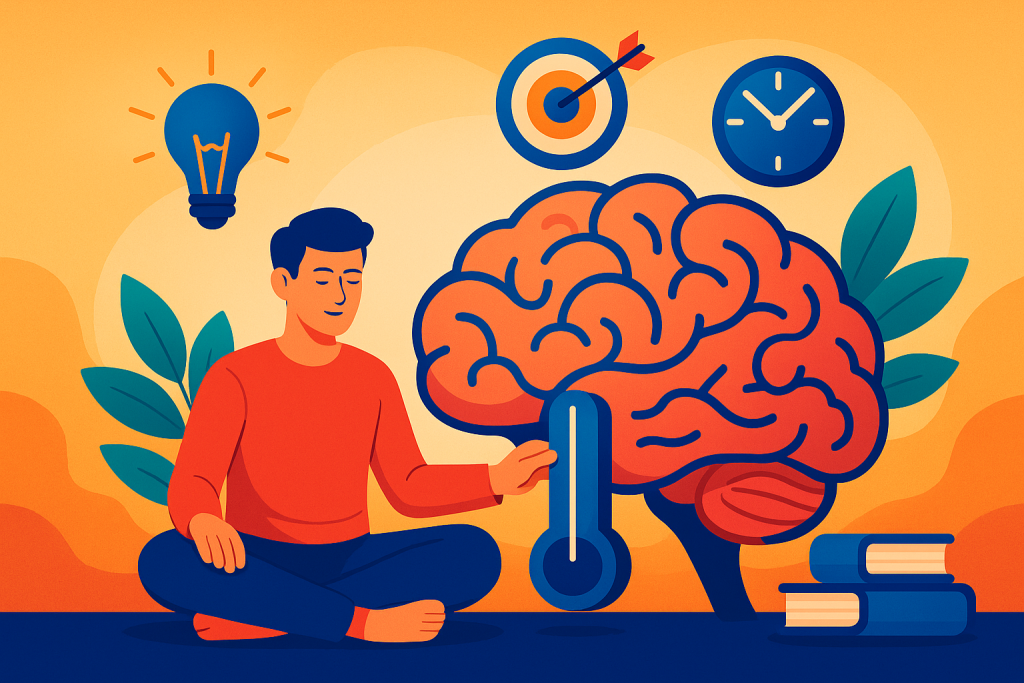If you want to learn faster, it’s time to treat your brain more like a muscle—with the right exercises, rest, and nutrition. In this guide, we explore cutting-edge methods and neuroscience-backed hacks—from memory palaces to micro-naps—to truly hack your brain for speedier learning.

1. Harness Neuroplasticity with Variety and Challenge
The science of neuroplasticity shows our brains continually rewire in response to new stimuli. That’s why exposing yourself to diverse, mentally challenging experiences helps you learn faster.
- New skills & hobbies: According to Harvard Health, engaging in novel learning—like a language or musical instrument—can bolster neural pathways and cognitive fitness .
- Novel environments: Dr. Budson notes that traveling and meeting different people stimulate neuroplasticity
- Mental discomfort: Small daily changes—like using your non-dominant hand—force your brain to adapt, sharpening focus and increasing adaptability
2. Memory Techniques: Spaced Repetition, Chunking & Palaces
Classic mnemonic systems are far from outdated; they remain top-tier tools for learning faster.
Spaced Repetition
Revisit material at increasing intervals (e.g., Day 1, 2, 4, 8…). Research shows this boosts long-term memory retention and reduces cram time
Chunking
Break large info into smaller, meaningful chunks—like phone numbers. Studies on Alzheimer’s patients confirm chunking improves working memory
Method of Loci (Memory Palace)
Visualize information placed in physical locations (rooms, routes). Research shows this activates spatial and hippocampal regions—greatly improving recall
3. Boost Focus & Retention: Active Recall, Testing & Meditation
Active Recall & Testing
Self-quizzing (flashcards, practice tests) dramatically improves long-term retention—more than just re-reading
Desirable Difficulty
Making tasks slightly harder—e.g., mixing topics (interleaving)—reinforces learning through mental effort, encouraging deeper encoding
Meditation & Mindfulness
Regular meditation increases cortical thickness and improves attention networks, making it a powerful tool to learn faster
4. Optimize Physical Supporters: Sleep, Exercise & Micro-Naps
You can’t bypass biological needs—they’re essential for peak brain performance.
- Sleep & micro-naps (NSDR): Deep sleep consolidates memories; short naps during learning can boost recall speed by up to 20%.
- Exercise: Physical activity enhances blood flow, supports memory, focus, and overall cognitive function .
5. Brain-Training Tools & Tech Integration
Emerging tech now lets you use biofeedback and game-based systems as cognitive accelerators.
EEG Biofeedback
Wearables like NeuroSky and NeuroPlus track attention and suggest learning/rest rhythms—auto-adjusting study flow .
Cognitive Games like Tetris
A recent Swedish study showed an 86% reduction in intrusive memories—and boosted mental agility—from brief gameplay sessions.
6. The “Super Protocol” Framework for Learning Faster
Adapted from Stanford’s Huberman Lab and other labs, here’s a step-by-step method to learn faster:
- Pre-Learning Setup
- Hydrate, nourish, stretch, and pick a varied learning method (e.g., memory palace, flashcards).
- Focused Learning Burst
- 25–50 minutes of deep study using active recall, chunking, or interleaving.
- Micro-Nap / NSDR
- 5–20-minute guided relaxation post-session to consolidate neural changes.
- Review Cycle
- At intervals: 1 day, 2 days, 4 days (spaced repetition).
- Reflection & Fixes
- At session end, summarize verbal or written takeaways to reinforce memory.
Cheat Sheet: Core Strategies to Learn Faster
| Strategy | What It Does | Why It Works |
|---|---|---|
| Spaced Repetition | Enhances long-term recall | Optimizes the forgetting curve |
| Active Recall | Strengthens memory encoding | Proven via testing effect |
| Chunking | Reduces cognitive load | Helps working memory |
| Memory Palace | Boosts sequential memory recall | Activates spatial-hippocampus |
| Meditation | Improves attention, flexibility | Increases cortical thickness |
| NSDR / Micro-naps | Consolidates learning | Rapid memory improvements |
| Physical Exercise | Elevates overall brain health | Enhances memory & concentration |
| Biofeedback & Games | Boost engagement and executive skills | EEG-adjusted learning |
Wrap-Up: Build Your Brain Hacking Habit
To truly learn faster, combine:
- Core memory strategies (spaced repetition, chunking, memory palace)
- Mental training (active recall, meditation)
- Physical support (sleep, naps, exercise)
- Tech-informed enhancement (biofeedback, games)
Over time, this creates a sustainable ecosystem—your personalized brain hacking routine for lasting acceleration in learning.
References
- EEG biofeedback in education—Wired (2019 data) wired.com
- Spaced repetition science—Wikipedia overview
- Testing effect in education—Wikipedia overview en.wikipedia.org+1en.wikipedia.org+1
- Chunking mental load research—Wikipedia overview
- Memory palace spatial-hippocampal activation—Wikipedia and neuroscientist input
- Meditation’s impact on brain structure—Wikipedia overview en.wikipedia.org
- NSDR/micro-nap boosts—Huberman Lab summary hubermanlab.com
- Exercise improves cognition—Harvard Health and UCLA meta-review health.harvard.edu






